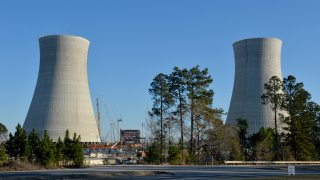
The Illinois Senate approved lifting a 36-year-old moratorium on new nuclear power installments on Wednesday in a plan proponents say will ensure the state can meet its carbon-free power production promise by 2045.
The Senate's 44-7 endorsement opens the door for cutting-edge nuclear technology in so-called small modular reactors, designed to sit on sites for which they produce power, such as large factories.
Environmentalists have criticized the plan, noting that small modular reactors are a decade or more from viability. Sponsoring Sen. Sue Rezin, a Republican from Morris, said that's the reason, coupled with a federal permitting process of as much as eight years, her legislation is timely.
“If we want to take advantage of the amazing advancements in new nuclear technology that have occurred over the past couple of decades and not fall behind the rest of the states, we need to act now,” Rezin said.
The House has through Thursday — the scheduled adjournment of the General Assembly’s fall session — to OK the proposal and send it to Gov. J.B. Pritzker.
Under the legislation, Illinois would allow development of small modular reactors in January 2026. That's when a report on necessary safety measures and updated guidelines would be due.
The plan also tasks the Illinois Emergency Management Agency with oversight of newly installed reactors. Rezin added that layer of inspection, despite her contention that strict federal control is sufficient, to appease a concerned Pritzker. The Democrat cited the issue as one that caused him to side with environmentalists and veto initial legislation Rezin saw approved overwhelmingly last spring.
Local
Just over two years ago, Pritzker signed a law requiring the state to use only carbon-free electricity by 2045. That means closing numerous coal-fired power plants and investing heavily in wind and solar energy. It also included a $700 million bailout to keep afloat two unprofitable nuclear plants in the state, validating for Rezin and other supporters that nuclear power must remain part of the picture.
“As we move toward a clean energy future and we start taking certain types of energy offline, we have to have something to replace all those megawatts,” said Sen. Patrick Joyce, a Reddick Democrat. “As technology changes, we need to make sure that we change with it.”
Feeling out of the loop? We'll catch you up on the Chicago news you need to know. Sign up for the weekly Chicago Catch-Up newsletter.



